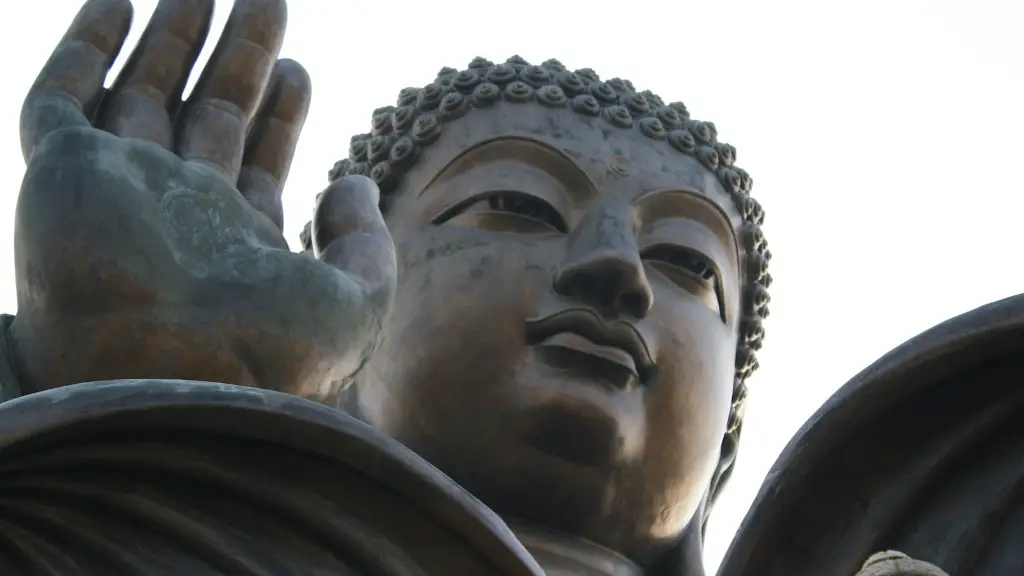Vedanta is one of the six schools of Hinduism and is known for its focus on the Vedas, a collection of sacred scriptures. Originally developed in ancient India, Vedanta is a system of beliefs that are based on the Vedas and other revered Hindu texts. It focuses on the concept of Brahman, the ultimate divine reality that underpins all of creation and existence.
Vedanta theology is based on three basic concepts – Dharma, Karma and Moksha. Dharma is the path that one should live their life by, as it is the path of righteousness and proper behavior. Karma is the law of cause and effect that guides the way events unfold and is based on the choices people make in their lives. Finally, Moksha is the state of enlightenment in which one can experience true knowledge and understanding of Brahman.
Vedanta stresses that there is a single, unchanging reality underlying all of creation and existence. In Hinduism, this ultimate reality is known as Brahman. Brahman is seen as the ultimate source of all things, and as such, it is the object of worship for Vedanta followers. Ultimately, Vedanta seeks to reconcile the individual with this one underlying reality. This is done through meditation, yoga, and other practices which bring the individual in contact with the divine.
The main idea of Vedanta is that all aspects of reality can be traced back to a single source. This source is known as Brahman and is seen as the eternal and unchanging basis of all creation. The goal of Vedanta is to help individuals develop a connection with this single source and to learn to recognize the divine within them. Through proper practice, it is believed that this connection can lead to greater self-awareness, personal transformation, and ultimate liberation from the cycle of life and death.
The Vedas are the primary source of knowledge when it comes to Vedanta. The scriptures provide various guidelines and teachings, primarily focused on the nature of Brahman and how to reach liberation. The Vedas also help to define and structure the Hindu religion, providing a basis for the various rituals and beliefs that are seen in Hinduism today.
Vedanta has been influential throughout the history of Hinduism, and continues to be an important school of thought in the religion. While the original texts of Vedanta were written in India centuries ago, the ideas and beliefs that are taught in the school of Vedanta can be found in many cultures and religious traditions today. For Hindus, Vedanta provides a means to connect with the divine and find peace within themselves.
Vedanta & Self-Realization
Vedanta teaches that the ultimate goal for individuals is to reach a state of self-realization, or realization of the true self. This is accomplished by recognizing the divine within oneself and allowing it to be the guide on one’s spiritual journey. Through self-realization, individuals are believed to gain a greater understanding of the universe and their place in it.
Vedanta encourages individuals to look inward and strive to understand the divine truths that are hidden within themselves. In order to reach this state of inner understanding, individuals must develop a relationship with Brahman and strive to become one with it. This relationship is developed through various practices such as meditation, yoga and chanting of mantras.
Vedanta teaches that, through proper practice and dedication, individuals can recognize the ultimate reality that underpins all of creation. This knowledge is believed to lead to a greater understanding of the true self and one’s place in the universe. This ultimate understanding can lead to a sense of peace and liberation from the material world, as well as greater wisdom and freedom to choose one’s path in life.
Vedanta & Morality
In addition to recognizing the divine within oneself, Vedanta also stresses the importance of having a moral compass to guide one’s actions. The concept of Dharma is paramount in Vedanta and is seen as the path of righteousness and proper behavior. Dharma is believed to be the path that leads to liberation, and as such is the primary focus of Vedanta philosophy.
In Vedanta, morality is not seen as an arbitrary set of rules imposed by a higher power, but rather as the necessary means to reach self-realization. Dharma is seen as the path one must walk in order to gain a greater understanding of the true self and to eventually reach liberation. In this way, Vedanta teaches that morality is an essential part of the spiritual journey.
Vedanta encourages individuals to live a life of virtue and strive to fulfill their spiritual goals. By living a life based on the principles of Dharma, individuals are believed to gain a greater understanding of their true selves and the divine. This understanding is seen as the means to becoming one with Brahman and ultimately achieving liberation.
Vedanta & Its Influence
Vedanta has had a long and influential history in Hinduism, and its teachings can be found in many other religions and spiritual traditions as well. The school of thought has had a profound impact on the Hindu religion, providing a basis for many of its beliefs and practices. Vedanta includes various lineages, such as Advaita Vedanta, Sankhya Vedanta, and Yoga Vedanta, which are still influential in Hinduism today.
In recent years, Vedanta has also become more popular outside of the Hindu religion. The school of thought has had an influence on modern spiritual teachers and movements, such as yoga and Buddhism. Many of these teachings have been adapted and used by individuals to explore their spiritual identity and to guide their life choices. As such, Vedanta has become increasingly popular in the Western world.
Vedanta is a complex and influential school of thought within Hinduism. It is based on the teachings found in the Vedas and other sacred Hindu texts, and is focused on the concept of Brahman, the ultimate divine reality that underpins all of creation and existence. Ultimately, Vedanta seeks to help individuals to reach a greater understanding of the self and the divine, through practicing Dharma and striving for personal transformation.
Vedanta & Meditation
Meditation is an important practice within Vedanta, as it is seen as the key to unlocking self-realization. Through meditation, individuals are able to open themselves up to the divine and gain access to the knowledge and wisdom that it contains. Vedanta teaches that meditation can be used to bring the self into a state of harmony and peace, allowing one to become aware of the ultimate reality and the infinite power of Brahman.
Meditation is believed to be the path to enlightenment, and Vedanta promotes the practice of various techniques, such as mindfulness and breathwork. The aim of these techniques is to help individuals become aware of the true self and to experience a sense of divine connection. With a disciplined meditation practice, individuals are believed to be able to gain a greater understanding of the universe and their own place in it.
Vedanta encourages individuals to practice meditation in order to experience a sense of inner peace and to gain a greater understanding of the divine. Through dedicated practice, it is believed that individuals can develop a relationship with Brahman and achieve liberation from the material world. Ultimately, the practice of meditation is seen as the path to self-realization and enlightenment.
Vedanta & Yoga
Yoga is another important practice within Vedanta and is seen as a way of connecting with the divine and reaching liberation. Through the practice of yoga, individuals are able to develop a deeper understanding of their relationship with the universe and experience a sense of harmony and peace. The aim of yoga is to help the individual become aware of the ultimate reality and to bring the body, mind and spirit into balance.
Vedanta stresses the importance of practicing yoga in order to develop a connection with Brahman and to experience its true power. Yoga helps individuals to recognize their true selves and to open their hearts to the divine. Through the practice of various techniques, such as asanas and pranayama, individuals are believed to gain access to inner wisdom and understanding.
Vedanta teaches that yoga is an important part of the spiritual journey and encourages individuals to practice the various techniques in order to achieve physical and mental balance. Through dedicated practice, it is believed that individuals can gain a greater sense of self-awareness and a closer connection to the divine. Additionally, the practice of yoga is seen as an integral part of achieving self-realization.


